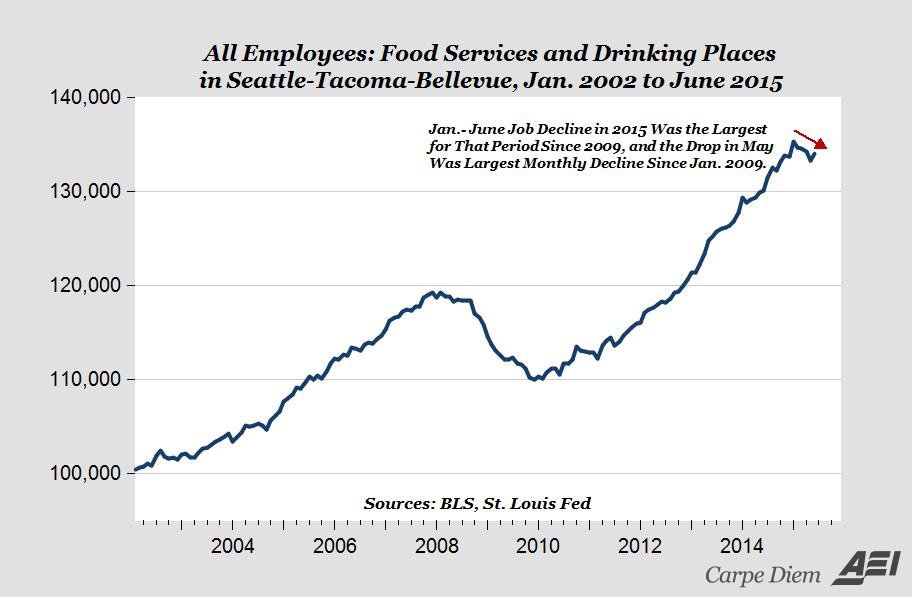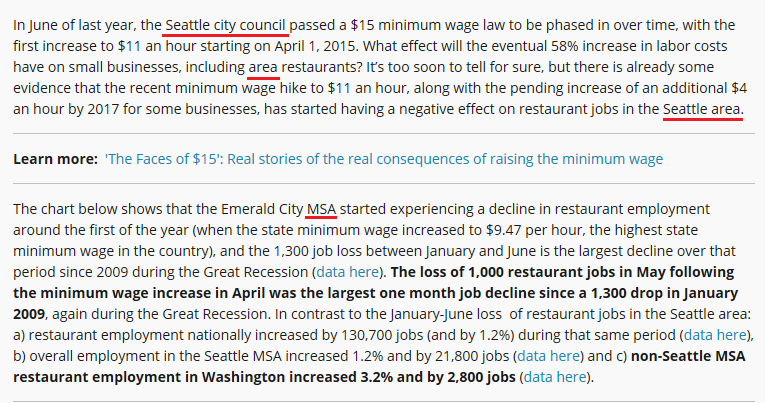@TBPInvictus
“He who knows nothing is closer to the truth than he whose mind is full of falsehoods and errors.” – Thomas Jefferson
If you’ve followed me at all recently, you know I have a keen interest in the minimum wage experiment that is going on in the city of Seattle, which last year approved increases to be phased in – ultimately to $15/hour – over the next several years.
Critics of the minimum wage – any minimum wage – claim that raising it will be (or already has been, even absent any data) a job-killer, particularly in the food services industry, where many minimum wage earners toil. Hence, watching the level of those workers becomes critical to assessing the success of the experiment. I’ve already written several pieces on this topic as events have unfolded.
It’s hard to know with any degree of precision how things in Seattle are playing out. It’s also still very early innings. As data collection goes, good numbers for the city are available at the American Community Survey and/or American FactFinder, but they’re only current through 2013 right now, with 2014 being released next month, I believe.
It is due to the paucity of good, fairly real-time employment data that I have taken to regularly reporting the level of food services permits for Seattle city. Though it does not provide me with employment data, it indisputably puts our finger on the pulse of the restaurant industry. Imperfect as it might be, we are on safe ground making the logical assumption that restaurants, especially new ones, hire employees, and if the industry is thriving, it is probably adding payroll. It’s less than ideal, but it’s currently the best we’ve got.
And those numbers have been growing steadily for the past five months, and are higher than they were a year ago, as shown by Evan Soltas back in March.
The inability to source the ideal metric should not, of course, excuse someone for taking a piece of irrelevant data and using it to advance his argument that the increased minimum wage is already failing miserably. Which is exactly what the American Enterprise Institute’s Mark Perry did.
Perry produced the following chart in a post titled: “Minimum Wage Effect? January to June Job Lossess for Seattle Area Restaurants (-1,300) Largest Since Great Recession.”
Perry, in a misleading sleight of hand, accompanied the chart with this text (my red underlines):
Here’s the big reveal:
Looking at the chart, you might wonder why it’s representative of Seattle-Tacoma-Bellevue (as opposed to Seattle proper). What’s that about? As I mentioned, we don’t have good, current information on Seattle city, and won’t for some time. You might also wonder about Perry’s references – after mentioning “the Seattle city council” – to the “Seattle area” and the “Emerald City MSA.” What’s that about? What’s a MSA?
And therein lies the chicanery – a subtle conflation of the city of Seattle with its surrounding MSA:
A MSA is a Metropolitan Statistical Area: Metropolitan and micropolitan statistical areas (metro and micro areas) are geographic entities delineated by the Office of Management and Budget (OMB) for use by Federal statistical agencies in collecting, tabulating, and publishing Federal statistics. The term “Core Based Statistical Area” (CBSA) is a collective term for both metro and micro areas. A metro area contains a core urban area of 50,000 or more population, and a micro area contains an urban core of at least 10,000 (but less than 50,000) population. Each metro or micro area consists of one or more counties and includes the counties containing the core urban area, as well as any adjacent counties that have a high degree of social and economic integration (as measured by commuting to work) with the urban core.
The Seattle-Tacoma-Bellevue MSA is rather large. In fact, it is the 15th largest MSA in the country and boasts a population of 3.6 million, covering some 5,900 square miles. The city of Seattle, by contrast, sports a population of about 650 thousand and covers some 143 square miles. The Seattle-Tacoma-Bellevue MSA counts the following among its “principal cities” – which is to say nothing of dozens of other smaller towns and villages – Auburn, Bellevue, Everett, Kent, Lakewood, Redmond, Renton, Seattle, and Tacoma. Importantly, keep in mind that the minimum wage increase took place only in the city of Seattle. It is the only area of concern in that regard.
So, you might ask, what could we possibly learn about food services employment in the (smallish) city of Seattle by looking at the (vastly larger) Seattle-Tacoma-Bellevue MSA, which has a population more than five times its size? Answer: Probably not much. Perry’s post was essentially a waste of good pixels. It gave us no new information, nor did it inform us about the state of affairs vis-à-vis the new minimum wage in Seattle. It was little more than an ideologue latching on to a convenient, irrelevant data point in an ongoing effort to misinform and obfuscate, easily drawing in all those who don’t understand the nuances of “places” vs. “MSAs” (both Census terms). And, frankly, who beyond a few nerds actually wants to know those nuances? The AEI piece was, of course, immediately picked up by other like-minded outlets, thereby (sadly) spreading Perry’s speciousness far and wide.
The simple fact of the matter is that the jury is still out – and will be for a while – on Seattle’s minimum wage experiment. We won’t know for a long time to come. Early indications, by way of the aforementioned food services permits numbers, look encouraging, as industry growth appears intact. Seattle’s unemployment rate is also very low. Additionally, as I’d mentioned in a prior post, one Seattle contact – who is in a position to know – suspects it will be rents before wages that slows the growth of restaurants.
But the bottom line is this: We have offered up in great detail the specifics of the data that are actually available. See this, this, this, this and this. The opposing side of the debate has offered misleading narratives and rhetoric. Choose your belief system with care.




Invictus had better stop putting Jefferson on the header to avoid be accused by the progressive Soviet, aka, the Democratic Party , of being a white priviledge elitist.
Being accused of elitism by the “Soviet, aka, the Democratic Party” would probably still be better than a similar accusation from the Nazi aka Republican Party since they’re famous for shooting first and talking later, eh?*
*Yeah, I know, shouldn’t feed the trolls (or respond to off-topic, ad hominem drivel in a similar vein either); apologies to the general audience.
The word in Seattle is that Amazon has been hiring 2000 new workers/month. Many are just out-of-school and assume eat-out the majority of meals. This alone would increase restaurant hiring.
Yes there is always some way to try and squeeze reality back into the narrow confines a your favorite narrative. For most of the true believers it doesn’t really matter how dishonest contorted and reality challenged that the process is – as long as it end up with the right conclusion.